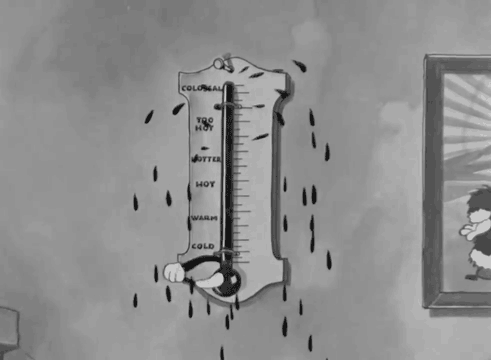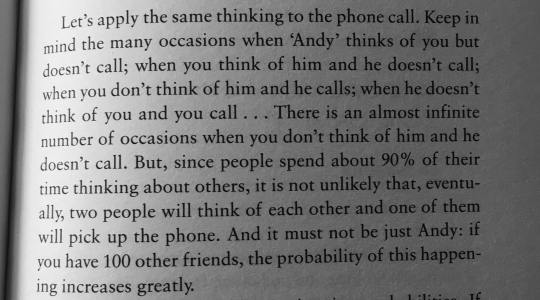Text
Great Ni description:
It means not just being the observer of the thought but the observer of the one within who is doing the thinking.
#ni#introverted intuition#intj#infj#entj#enfj#estp#esfp#isfp#istp#cognitive functions#mbti#credit to#/u/Blarebaby
20 notes
·
View notes
Text
Cognitive Functions and What They Look Like Explained with Objects
I’m going to attempt explain the cognitive functions better than I have before, and hopefully in a lot more depth. The risk with this is that it could be wrong, but at least an attempt was made. I’m not an academic or anything, I’m just writing from observation/experience stuff that I find helpful to understand. Hopefully this can help you type yourself more accurately too! All functions are described as they are in the first 2.
I hope this helps you see how EVERY FUNCTION IS IMPORTANT!
And no. None of these objects really make sense.

Fe: The Thermostat
A thermostat can’t feel whether it’s hot or cold itself, but it can feel if you are! And depending on how fancy your thermostat is, it will cool you or heat you until you’re just the temperature you want to be. That is its single goal in life: to keep you comfortable. If you’re sad, it will try to fix it.
Basically, Fe is about everyone being genuinely happy and comfortable. It wants to be in touch with other people and respond to their needs accordingly. It’s not necessarily good at showing or expressing this, but that’s its aim.
Well developed Fe is the function that encourages open discussion of problematic feelings that it KNOWS are right there - remember, it can FEEL them, cos it’s a thermostat. Poorly developed Fe ignores unspoken problems and pretends it’s a good little thermostat anyway.
If you’re upset with a Fe user, just tell them calmly. If you need space, just tell them calmly. If you’re angry, tell them why. READJUST THE THERMOSTAT. Don’t be surprised when the Fe user does the same - that’s their way of trying to keep everyone happy in the long run. Good Fe believes arguments are necessary. Bad Fe is passive aggressive and let things build up until they’re too big to handle. If you sense your Fe user is doing this, approach them about it and get it out while you still can. Fe users don’t talk about issues with emotions most of the time - they speak about feelings clinically. It helps if you explain to a Fe user how the problem makes you feel, but also that you still love them.
High Fe - is a natural thermostat. It doesn’t even realise that’s how it operates, it just DOES. High Fe users can struggle to even FEEL that they have their own problems, and can easily be ignored as a result (sheeple). As their Ti develops, they should become a little more self aware, and better at turning their natural thermostat off every now and again so they get a break. A key feature of high Fe users is that they’re just ALWAYS THERE. You might hate them, get sick of them, find them annoying, or feel like they don’t understand you… but they’re always there. Always trying. Immature high Fe is very sensitive to extreme temperatures, but with Ti development comes a bit more separation and ability to help you through, even if you’re not responding to their attempts at cooling/heating you. Because constantly living as a thermostat requires you to learn that SOMETIMES you just can’t change the weather. So at the end of the day, even though they’re not a T type, well developed high Fe users can actually be less sensitive and more useful in a rough patch than their low Fe counterparts.
Low Fe - is a thermostat with emergency settings. It kicks in at unusually high or low temperatures and gets it back into humanly-survivable temperatures. As Fe develops, low Fe users become more sensitive to other people’s temperatures and can regulate the environment a little better. While low Fe users aren’t naturally very sensitive to your extreme temperatures, they can become suddenly overwhelmed and deeply upset if things go too far and they’re the reason you’re not doing so well. With good character development, which is totally SEPARATE from MBTI, a low Fe user can become just as good at maintaining the perfect temperature as a high Fe user. It will just take a little more effort and skill. BUT, since they’re not always used to being a thermostat, they’re not always aware of what’s the weather and what’s their fault. So at the end of the day, even though they’re not an F type, well developed low Fe users actually seem to be more sensitive and fragile than their high Fe counterparts.

Fi: The Thermometer
The thermometer can’t really do anything about the weather - it can just tell you what’s going on. Fi users are very sensitive to what’s going on around them, and feel the need to regulate the climate they’re in as much as possible. That is: going against their own feelings can actually be painful for them. They feel a very strong NEED to be who they are. Fi is about being in touch with yourself and your own emotions/beliefs/you name it. Bad Fi can easily be selfish, but good Fi has the capacity to help where Fe stands… clueless.
Good Fi values you feeling good too! Fi users CAN apply their thermometer to others and get a reading on how hot/cold their climate is. They can’t feel your emotions like the Fe thermostats, but if you express emotion they can essentially measure it. Good Fi users try to help you in any way they would feel would be helpful if they were in your shoes. This means Fi users are much better at showing sympathy than Fe users.
If you’re upset with a Fi user, you have to tread carefully. They can be easily hurt, and will definitely take things the wrong way if you don’t articulate it correctly. The clinical approach of Fe users is often not appreciate, because it’s interpreted as cold, uncaring, or worse - nasty. You’ll have to express a lot more emotion when talking to a Fi user. From what I’ve found, you have to approach Fi with Fi, so I’ve never managed to do this successfully. It always becomes a fight for like an hour until finally the Fi user understands what I was trying to say. So, from what I’ve found, Fi finds the Fe approach hostile, but responds better to genuine displays of emotional vulnerability.
High Fi - is a natural thermometer. It knows what it’s feeling, what it believes in… all that jazz. It finds it hard to compromise its feelings and beliefs for ANYTHING or ANYONE. It can be kind and sensitive as a result, but also very fragile and easily overwhelmed. Well developed Fi users learn to work through the emotional instability of thermometer life, but immature Fi can be unstable and selfish. Te development helps high Fi users get on with things and move through whatever they might be feeling. They can apply that same resilience to others who are suffering, and inspire people to get through their emotional lows. So at the end of the day, even though they’re not a T type, high Fi users can function better under emotional pressure and inspire action better than their low Fi counterparts.
Low Fi - is a thermometer that is usually ignored in favour of getting things done. This means high Te users can be confident and headstrong most of the time, but occasionally have dramatic shut-downs into low Fi. And since they usually ignore their thermometer, they don’t really know what to do about it. HOWEVER, well developed low Fi users can learn to apply their thermometers to others with some skill. And they can be more overwhelmed by others’ emotions because their Fi is so low. So, at the end of the day, even though they’re not an F type, well developed low Fi users can be more sensitive and sympathetic than their high Fi counterparts.

Te: The Car
The car is designed to get you from point A to B without death or injury. It’s complex, but not too much can go wrong at any given moment. The process itself is fairly simple: engine sparks, wheels go round - drive. Te wants to get to point B quickly, and is focused on action and outcomes. And if you stand in its way, you might get run over. It isn’t necessarily focused on the steps required to get from point A to B, it just sees the end and drives.
Well developed Te values doing things effectively as well - not just getting them done in the first place. This means Te users can be persuaded to change their approaches and routes providing you can argue that it’s worth it. Te is good at seeing potential in other people, but can make the mistake of seeing the end point and missing the starting point or steps required to develop.
If you’re upset with a Te user, you’ll have to appeal to Fi. No one likes criticism, not matter how high a T function is! However, high Te users can tolerate and even appreciate the Fe approach to relationships and conflicts, providing they’re not having a low Fi moment.
High Te - This is life in the car, on the road. Always heading towards a new goal. However, contrary to popular opinion, Te users can actually be very kind and considerate! Providing they’re well developed, Te aims to take care of the people it loves. High Te users can fall into the Te trap of seeing the person’s potential without recognizing they’re not quite there yet. They can be very idealistic and romantic in relationships because their Fi is so low. They can also be angry little cars who run people over if they’re poorly developed or just mean. This is why Te users have a reputation for being cold and controlling. I’ve found Te users only really act like this when they’re succumbing to low Fi.
Low Te - This is the car that mainly sits in the garage, but occasionally comes out for a Sunday drive. Although, poorly developed low Te looks like saying mean things just to hurt people when you’re upset, or provoking people for a reaction.High Te users definitely go through phases like this when they’re young, but low Te users are more open to these problems when they’re older. Well developed, low Te helps high Fi users overcome their overwhelming feelings and get through things. It may even help them compromise if they absolutely must.

Ti: The Aeroplane
The aeroplane is designed to take you over long distances very quickly, and as safely as possible. There are back up systems, back up systems for back up systems, and multiple things can go wrong if you forget to do even one simple thing. It’s a much more dangerous process than driving, but it’s also much faster if you’re trying to go far.
Ti is about understanding things so that you can run your life well. Poorly developed Ti is dysfunctional, but well developed Ti can get you pretty far with very little effort! But unlike Te, Ti isn’t as focused on the end destination so much as it is on the steps required to get there. Every little detail matters, just like on an aeroplane. And if even one small detail has been misunderstood, the Ti users’ entire understanding of something can go crashing down like an aeroplane. They MUST understand the parts to understand the whole.
If you’re upset with a Ti user, you can refer to the Fe section. Ti users prefer a clinical approach to emotions simply because they want to UNDERSTAND rather than be overwhelmed by negative feelings their thermostat will detect once you start crying in front of them. Ti will then engage thermostat measures to ensure relationship contentment.
High Ti - Life in the sky as a pilot. The Fe thermostat doesn’t matter so much when you’re trying to make sure you don’t fall out of the sky. High Ti users aim to understand every small thing in life. Poor high Ti users have a faulty misunderstanding and drive everyone insane arguing they’re right. Well developed Ti users have a good understanding, but often enjoy arguing anyway, just to make sure they don’t have any flaws in their understanding. When you’re arguing against yourself, you have to know your stuff pretty well! While they’re not given enough credit for it, high Ti users can be very considerate in relationships, and aim to understand their loved ones just as well as everything else. Ti isn’t satisfied with a functional understanding, so it may provoke and tease to better understand people. And when it goes too far and upsets people, the emergency thermostat kicks in to fix the problem.
Low Ti - life in the sky as a co-pilot. Low Ti users prefer to take their cues from someone ELSE - preferably the pilot (high Ti user). Low Ti users can be overwhelmed if they have to take on too much responsibility or have to understand too many small details. Then they can feel like a co-pilot taking control of a plane after the pilot has died and the plane is spiraling down. They’d rather do what they’re told and keep the pilot happy! But they also take comfort in knowing that - if it really comes down to it - they can fly the plane and land safely. They like knowing they have back up systems, back up systems for back up systems, and are capable of making it out alive.

Ne: Google Search Auto-predict
You’re not even finished typing, and Google already has 10 ideas about what you might be asking. That’s the Ne brain - branching out, and out, and out… sometimes a bit TOO out.
High Ne - Google search auto-predict is always on. It all happens at once, just like how Google suggestions change with every letter you add. And when you finish your question, it’s kind of disappointed you didn’t ask one of the 10 other more interesting ones. Easily bored, always sees a better option… but also very good at picking which option is most realistic. May or may not care.
Low Ne - random auto-predict. Because sometimes Google doesn’t predict anything as you type? That’s a weird phenomenon. But then it’ll just suddenly appear halfway through a sentence? Yeah… like that. Poorly developed low Ne can mistake every new idea as a great idea, but well developed low Ne knows which ones are worth listening to :)

Ni: Google Search Results
Did you mean…? Not only shows you every single possible thing on what you Googled, but also shows you what could be immediately connected to it.
High Ni - Figures out what you’re looking for based on a few key words that may or may not have made sense - understands your typos. Does it all in seconds, doesn’t really understand the algorithm. Just does it. Can take you down a rabbit hole for hours. Forgets about time as a concept. Sometimes connects strange things, but somehow makes sense anyway. Usually isn’t wrong about what you were Googling. Bad Ni thinks it knows everything though, and forgets it needs to add things to its database. Good Ni is always learning MORE
Low Ni - Like the 20th page of Google Search Results. Doing the same thing as high Ni, but not as effectively. Might have a few conspiracy theories in there. Might’ve misunderstood your question or taken the typos literally. Occasionally gets it right, but the best results are usually on the first page anyway.

Se: The Camera
Takes a picture of the moment, every detail rendered exactly as it was.
High Se - High focus camera, good colour, good lighting - the kind of pictures you want to keep forever and frame. Se knows what’s right in front of it. It doesn’t miss anything it can see. Might not understand what’s about to happen, but knows what IS happening.
Low Se - Like a polaroid camera, and the pictures might not be worth keeping. Awkward shots that are accurate but not great quality. Might be blurry, not really able to see faces… just a LITTLE bit out of focus, so that you miss something that was pretty obvious. Has a kind of artsy vibe though.

Si: The Diary
Recorded everything, but from a very subjective point of view that may or may not be accurate. Is structured so that it can be read again and again.
High Si - A very detailed diary. Concerned about detailing every aspect of life. Some pages have been ripped out. Sometimes pages are inserted to add in additional information that may or may not alter the entire memory. A nice little organised diary that’s written very neatly.
Low Si - A diary that gets an entry once every 6 months or so. Still valued and personal, but a lot is missing. Since it’s less tended to, pages are less likely to be missing or replaced - so what’s written is probably more accurate. There’s just not that much of it. A very badly written diary that’s got coffee stains and might not be entirely legible.
1K notes
·
View notes
Note
I personally want to say that I like yours different approach to E/I, as personally I don't see how these connect with socialising as it can be loaded with shyness, overthinking, slow reactions and the themes of socialising itself. The tiredness after socialising can come from a lot of variables, not solely from being an introvert. So really nice article, at least in my opinion. Thank you
Aw, thank you! :’)
I’d like to have a concise and foolproof way of differentiating between E/I, but it gets complex very quickly, as you’ve yourself noted.
Though I can always tell them apart when I am interacting with someone. Ahh...
8 notes
·
View notes
Note
I've always considered myself an introvert, but I'm pretty self-assertive and when I read your post about tips towards being an extrovert, I answered yes to most of them. However, I still feel tired when I get home each day, and I have to recharge after spending a lot of time with people, which seems like it's the "base" defining factor of introversion/extroversion. Basically, I seem to fit the extrovert personality type but people still drain me. What does this mean? Thanks for the help!
It’s confusing, isn’t it?
Based on the information you’ve provided, you strike me as someone who is highly self-driven, self-directed and confident. Even if your self-esteem fluctuates, you still believe that your opinions are worth hearing and your needs must be respected. You might also be good with people but ultimately feel drained by interaction if it doesn’t serve a purpose or meet some of your needs. (That is, if I got it right.)
As such, it doesn’t surprise me that you’re on the fence.
If you’ve always considered yourself an introvert and my post made you doubt yourself, it could mean three things: either you’re an introvert with strong use of extroverted functions, or an extrovert who is not thriving, or perhaps my post was simply misleading and needs reworking.
Extroversion is simply energy direction to the outside world. It means initiating projects and interaction, voicing many of your thoughts, controlling the environment, or caring a lot about external results and rewards. Constantly.
It also means that extroverts are more responsive and prefer to have the constant stream of feedback because it’s energising. They also are much more attuned to what’s going on in the world right now, and they will probably react to most of it via commenting or letting it change the course of their action(s).
Introverts, on the other hand, can exhibit all of these behaviours, but more often than not, they will have much weaker attachment to the external world, which can manifest as passivity. This is because introverts don’t care about external rewards as much, which is why they are less motivated to get outside input or external rewards. They can be, of course, and all healthy individuals do to some extent, but you’ll see in them how they naturally gravitate towards stubbornly prioritising their own idiosyncratic way of being in the world.
Not to say that extroverts cannot be individualistic. Everyone has unique traits, especially if your introverted functions are developed. But extroverts will be quick to prioritise new information over their own personal experience, either wilfully or not, simply by virtue of being attuned to the external world. This can manifest as struggle to understand their inner world because they always get distracted from it.
Actually, this is what inspired me to write that post. I’ve seen some extroverts become chronically withdrawn because there is an overwhelming inner part of them that they somehow cannot reconcile with the world around them. As such, it gets exhausting to constantly extrovert.
For example, I know of a few ENFPs who exhibit a lot of introverted behaviours because they have so many emotional problems that they cannot help but remain withdrawn. They get quickly exhausted by social interaction because their unresolved emotions weigh on them so much. And yet they are still ENFPs because of very clear NeFi use.
There are many examples of how some people don’t fit the stereotypes. At some point, I believe, it becomes a waste of time to try to force yourself into a category and eradicate all doubt.
A more interesting question to ask, I think, is why you might be so quick to doubt your introversion, and why are you drawn to this ‘problem’ so much? You clearly want to understand yourself, but you also want to know where you belong in this world. I believe that once you begin to overthink these categories, you should be exploring your identity in ways that go beyond MBTI. (If I am not overstepping.)
But otherwise, I totally relate to you, and thanks for the great question. Apologies if my answer wasn’t very helpful.
#introvert#extrovert#mbti#ni dom#si dom#te dom#fe dom#fi dom#ti dom#se dom#ne dom#ask#shit this wasn't helpful at all sorry#lol#enfp
19 notes
·
View notes
Text
Are you really an introvert?
Are you torn between extroversion and introversion?
If this is your dilemma, chances are you’re an extrovert.
But should you depend on this probability? Wouldn’t you want to know for certain?
This is a difficult topic to deal with, especially if you’re relying on self-assessment alone. Your estimation of what’s introverted might differ markedly from someone else’s and vice versa.
Moreover, your behaviour might also be significantly affected by the environment you find yourself in, and, most crucially, how comfortable you feel in it. The less supportive environment, the more withdrawn a person will become - especially an extrovert.
This is why we should not rely on behavioural analysis. It’s too relative to be meaningful and accurate.
So how can you tell?
Clue 1: Have you been considered an extrovert by others? Have you considered yourself an extrovert before you went through significant challenges in your life that made you withdrawn?
Clue 2: In group setting, how quick are you to voice your thoughts, even if unprompted? Don’t be tempted to use moments of low mood as a reference point - most of us go silent during those.
Clue 3: Do you get impatient with those who take their time to respond to a question? For example, do you tend to talk over others sometimes?
Clue 4: Do you get easily annoyed when things are not moving fast enough, especially if it’s something you care about?
Clue 5: Do you tend to jump into things, willing to adjust the course along the way? In other words, do you get restless when you’re forced to sit down and think things through in detail (beyond most essential bits)?
Clue 6: Do you tend to start a lot of new projects quite regularly? Or perhaps you are the one who initiates contact a lot, or miss it very easily?
These clues point to extroversion.
However, they might be insufficient in some cases.
For example, you might be an extrovert who is surrounded by more expressive people. So you adapt and become more introverted by comparison as you take a listener’s position.
Otherwise, you might lack of confidence or feel constantly dismissed to the point where you stop sharing your thoughts. For self-protection, you might even isolate yourself.
And then if you’ve lived like this for a few years, it might be really difficult to believe that you’re an extrovert.
This is where ‘chances are’ becomes relevant again, however. If the doubt continues to creep back in (that you’re might be an extrovert), it could be that you’re craving to be an active part of the external world - a need that has been denied/neglected for a long time.
If you’re thinking that you might actually be an extrovert who has been introverting for a bit too long, you might be right. Perhaps you might even admit to yourself now that you’re an extrovert. But I bet that the doubt will arise again if you continue with excessively introverted habits. Meaning, you’ll doubt your extroversion again simply because you don’t behave as a typical extrovert.
This is because you’re caught up in a bigger cycle of self-doubt and low self-confidence that lets doubt bleed into everything you do and think. I would further guess that this dilemma is not the only one you have in your life.
It is only when you act according to your needs that your doubts will subside and your questions will have less ambivalent answers.
In other words, you cannot know for sure if you’re one or the other by behaving the same way as you have for a while now.
So try to respond to your needs, and things will clear up bit by bit. Take a chance.
TL;DR: don’t confuse self-doubt and withdrawn behaviour with introversion.
#introverts#extroverts#introvert#extrovert#extroversion#introversion#mbti#big five#big 5#entp#enfp#estp#esfp#entj#estj#enfj#esfj#istj#isfj#intj#infj#intp#infp#istp#isfp
90 notes
·
View notes
Note
I'm an INTJ and my boyfriend is an INTP and let me tell you, it's chaotic but fun. I really do think he's the one. Any thoughts on that pairing? Love your blog!
Endless banter… or, should I say, intermittent banter, as you try to accommodate each other’s asocial time.
I am actually quite intrigued. Both of you share an INTx temperament (reflective, introspective, calm and detached), but you go about things quite differently (due to functional differences). Must be quite fun indeed! Lots of mutual understanding, which means you are more likely to be accepted and embraced for who you really are.
Though I do wonder if his pedantic and analytic Ti-dom self doesn’t annoy your Ni way of thinking and vice versa… ;)
It also seem to me that an INTP would be a little out there, while you, as an INTJ, would try to get him grounded with Te. But then on the outside both of you are probably a little out there. Imagining it amuses me a little.
(Once again, though, this stuff goes beyond MBTI. I mean, some INTJs even marry ESFJs, while the two types want to strangle each other in MBTI community, so you get my point. In other words, I cannot tell anyone much from MBTI about compatibility. But you clearly don’t need it if you’re satisfied.)
Thank you for the compliment, by the way. It means a lot.:)
49 notes
·
View notes
Note
What’s your view on a relationship between ENFP and ISFP?
I haven’t encountered this type of relationship in my personal life/circle of friends, so I don’t know.
However, due to shared FP temperament, I believe there is a lot of potential for mutual understanding.
Nonetheless, something tells me that both types might get annoyed with each other rather easily. I feel like it must have something to do with Ne-dom and Se-aux clash.
(Though to be real here, this stuff goes way beyond MBTI. It’s much easier to date someone with whom you share similar goals and worldview, rather than the ‘perfect’ type according to MBTI compatibility theory.)
#sorry that i cannot be more help#general questions get generic responses i am afraid#that is all i can do#enfp x isfp#isfp x enfp#mbti#mbti relationships#enfp#isfp#enfp relationships#isfp relationships#ask
5 notes
·
View notes
Text
@random-esfp I work with an ENFP and this is literally what he does. His spreadsheets are little art projects he takes great care to aesthetically refine.
Playful Tertiary Function
ExFP - Te: barks out orders, enjoys unleashing their inner bitch, and then fails to follow through with supervision and coordination.
ExTP - Fe: makes things awkward by pointing out sexual tension in the air.
ENxJ - Se: gets inspired by a Pinterest/Tumblr post to produce mildly aesthetically pleasing (but otherwise basic) DIY project.
ESxJ - Ne: uses the same joke for the 863th time. Hey, it still works.
IxFJ - Ti: semi-politely points out an error in logic in what someone’s saying, fails to keep up with resulting debate.
IxTJ - Fi: tries to counsel and emotionally comfort someone, gets misunderstood and gives up in frustration.
ISxP - Ni: successfully predicts what is going to happen, but only if it’s a low stakes small event.
INxP - Si: re-watches the same TV show for 154th time.
365 notes
·
View notes
Text
The Irony of Suppressed Aux Function
ENxJ: thinks they are special; measures it by meeting conventional standards of success.
ESxJ: believes micromanagement to be necessary to prevent disaster; engages in controlling/meddlesome behaviour that ultimately produces discord.
IxTJ: believes oneself to be factual and objective; remains stubborn in the face of no evidence/poor results.
IxFJ: claims to have a “reason” for something and only trusts their own judgement; fails to explain their position clearly and coherently, all while refusing constructive criticism.
ExFP: thinks they are special and authentic; shows insecurity by excessive validation-seeking (as attractive and unconventional).
ExTP: thinks themselves to be logical and unbiased; only cites facts at their own convenience (to fit the narrative).
INxP: feels stuck and and as though they can’t progress; rejects new possibilities because of pessimistic attitude.
ISxP: doesn’t want to be trapped; feels restless because of refusal to commit.
#mbti#mbti types#mbti theory#mbti thoughts#entp#enfp#entj#enfj#intj#infj#intp#infp#estj#esfj#isfj#istj#estp#esfp#istp#isfp#ne dom#ni dom#te dom#ti dom#fi dom#fe dom#se dom#si dom#aux ni#aux si
177 notes
·
View notes
Text
Playful Tertiary Function
ExFP - Te: barks out orders, enjoys unleashing their inner bitch, and then fails to follow through with supervision and coordination.
ExTP - Fe: makes things awkward by pointing out sexual tension in the air.
ENxJ - Se: gets inspired by a Pinterest/Tumblr post to produce mildly aesthetically pleasing (but otherwise basic) DIY project.
ESxJ - Ne: uses the same joke for the 863th time. Hey, it still works.
IxFJ - Ti: semi-politely points out an error in logic in what someone’s saying, fails to keep up with resulting debate.
IxTJ - Fi: tries to counsel and emotionally comfort someone, gets misunderstood and gives up in frustration.
ISxP - Ni: successfully predicts what is going to happen, but only if it’s a low stakes small event.
INxP - Si: re-watches the same TV show for 154th time.
#mbti#mbti types#tertiary function#cognitive functions#entp#enfp#estp#esfp#entj#enfj#estj#esfj#isfj#infj#istj#intj#isfp#istp#infp#intp#myers briggs#ne#se#ni#si#fe#fi#te#ti#tert ne
365 notes
·
View notes
Text
*INFJ thinks of a specific person*
*5 minutes later, the person calls*
INFJ: This is the power of Ni, I am *such* a psychic. Carl Jung was right, synchronicity is real.
ENTP:

Who knew that an ENTP can be a buzzkill?
#the art of thinking clearly#entp#infj#synchronicity#probabilities#entp x infj#infj x entp#ne vs ni#ni vs ne#mbti#mbti types#funny mbti#mbti memes#mbti humor#dom ni#dom ne
245 notes
·
View notes
Text
Great tips, thank you guys!
It is crucial to get re-inspired (if that’s even a word), haha
Honest question to fellow NPs, how do we become successful when we have no patience to get details right and just want to progress in leaps and bounds?
I start a bunch of projects that I want to bring to life asap, but to not have them flop, I need to exert more effort than I have estimated is necessary.
It doesn’t help that I somehow believe I should pick things up very quickly, and if I don’t, it’s quite demoralising.
Wow, speak of immaturity…
82 notes
·
View notes
Text
How each dominant function is perfectionist
Te-dom: everything is running perfectly in the external world - results are predictably consistent with expectations.
Ti-dom: the logical system is perfectly consistent, accounts for every contingency, and works without error.
Fe-dom: one’s behaviour secures positive social feedback, while everyone honours their social roles and responsibilities.
Fi-dom: personal beliefs and actions are perfectly consistent with one another.
Se-dom: one’s actions are perfectly in sync with the environment.
Si-dom: all expected details are present and well-accounted for without anything unexpected and therefore disruptive happening in place.
Ne-dom: the stream of inspiration that allows for growth in leaps and bounds is neither blocked, nor exhausted.
Ni-dom: everything falls into place according to one’s vision, and no observed action is unpredictable or misunderstood.
#mbti#perfectionism#mbti types#estj entj#te dom#ti dom#intp#istp#fe dom#esfj#enfj#fi dom#infp#isfp#se dom#estp#esfp#si dom#istj#isfj#ne dom#enfp#entp#ni dom#intj#infj
114 notes
·
View notes
Note
Listen I feel since you have a tumblr about the MBTI you know a good amount about it lol. So here’s the q. I took the test 4 different times on three different websites and I got 4 different answers. I got ENFJ,ISFJ,ESFJ,and ESFP. I’m so confused man is there anyway you can help me with said confusion lol?
Hi!
The types you listed seem to overlap a lot, general pattern being that you’re most likely a ExFx type. There is ISFJ in there, but the probability of you being an introvert is too low - roughly just 25%, if not less.
Speaking further of probabilities, you seem to display a pretty certain J preference, especially for FJ. For one, it’s rather common for FJs to mistype as P types, because tests are biased towards TJs when they’re assessing Js. As in, TJs structure their time more than FJs would, to put it crudely. FJs are Judgers in a sense that they value social/relationship closure, not task closure per se (as TJs do).
Moreover, it is also typical of FJ types to seek input from other people to help them assess themselves.
But I am only speaking in rather broad generalisations here, given the information I have to work with.
So far I am quite confident in you being an ExFJ type. You also display a rather consistent preference for Sensing. One of your scores was ENFJ. This is not unexpected, because if you are ESFJ, you might have a soft spot for ingenuity/inventiveness and silly humour.:) Typical of tertiary Ne (3rd cognitive function of ESxJ types, but that’s going a little deeper than your question intended).
Nonetheless, I cannot guess with confidence which type you are, though my hunch is that you’re ExFJ.
Going by rather superficial temperamental differences, both ESFJs and ENFJs are:
Active, outgoing, friendly, helpful, organized, planful, uptight, warm, overdramatic, diplomatic. They also can be controlling, unreflective, meddlesome and insecure.
This is how they differ:
ESFJs, unlike ENFJs, tend to be realistic, literal, nitpicky, expressive, resourceful down to earth.
ENFJs, unlike ESFJs, tend to be more optimistic, idealistic, aspiring, persuasive, ambitious, advocating, and yet also impractical, presumptuous, oversensitive.
I hope this helps a little. Feel free to ask any follow up questions.:)
7 notes
·
View notes
Text
How do you know when you’re using your type defensively to excuse your behaviour, versus when you’re using the knowledge of your weaknesses appropriately?
Simple: when faced with a challenge stemming from your lower functions, do you:
A) Avoid dealing with it seriously because it’s your “lower function” and therefore it’s “irrelevant/not important” to you?
B) Pay extra attention and energy to your blind-spot, despite it being a little taxing and unnatural, hoping to be better next time?
Guess which one belongs to the excuse-land.
#mbti#mbti advice#intj#entj#infj#enfj#enfp#entp#infp#intp#esfp#isfp#estp#istp#esfj#estj#istj#isfj#cognitive functions#inferior function#loop#grip
66 notes
·
View notes
Text
Have any of you noticed how the advice given to different types is actually good advice for all types at the same time?
Example from mbti-notes post:
aux Si: reflect on how to be content and prioritize accordingly aux Ni: take time to understand every side of an issue accurately aux Ti: acknowledge your flaws and improve systematically aux Fi: reflect on whether your ideas/actions support well-being aux Se: avoid assuming the worst to embrace new experiences aux Ne: work hard to actualize better possibilities for your life aux Te: change any beliefs that prevent success or cause failure aux Fe: improve your relationships and value their feedback
The advice for each aux function literally applies to every type. It just reads as: be more thoughtful, put in more effort, be willing to challenge your ego, and learn from experience. Just said from different perspectives, which the functions are.
But why limit yourself only to one perspective, as dictated by your type?
#mbti#thoughts#entj#intj#entp#intp#enfj#infj#enfp#infp#estj#esfj#istj#isfj#estp#esfp#istp#isfp#cognitive functions#aux function#auxiliary functions#aux si#aux ni#aux ti#aux fi#aux se#aux ne#aux te#aux fe
61 notes
·
View notes
Text
There is one thing that confuses me about MBTI.
Fundamentally, it doesn’t seem that profound or even meaningful. It doesn’t answer any of the questions that the people interested in the theory seek to find answers to.
In the community, we are cautioned against stereotyping and focusing too much on behaviours, or what certain types tend to believe in. This is because functions are mere cognitive filters that do not determine the content of your thought (therefore having pretty much no say in your actual personality traits).
But then we still treat this whole theory as personality theory??? Where “personality” implies a collection of traits, beliefs, aptitudes, skills, etc.? But this kind of goes against what MBTI permits (or more so, what Jungian cognitive functions permit).
So what exactly do cognitive functions aim to elucidate? Oh hey, I prefer to gather abstract (instead of factual & tangible) information about the world - great - but so what?
So what? Well, I am probably ~more intelligent~ than the average person due to my reliance on intuitive function, therefore I am naturally ~better~ than someone who lacks such preferences.
But this type of extrapolation immediately exits the realm of MBTI and instead enters the realm of cognitive aptitude measurement and its value in society. What we actually seem to care about is what MBTI type implies about us, but it’s at best a mere guide at suggesting what we might be good at. However, once you begin to reason about what you might be good at because your MBTI type suggests it, you’re no longer doing MBTI.
I don’t even know where I am going with this.
Basically, I don’t see how MBTI can tell you anything real and tangible about who you are - say, the actuality of the probability that your MBTI type suggests. It cannot tell me what my actual intellectual aptitudes are, despite the correlation between Intuition and higher IQ (according to what exactly?). And yet these aptitudes (realities of “who I am”) are what actually interests us.
So... in conclusion, MBTI, in my eyes, cannot ever tell you what you are actually like - at best, it will narrow down possibilities so the search is possibly easier for you. But there is nothing about MBTI that will tell you about your actual - not possible - self. So why treat it as anything that meaningful?
#mbti#mbti rant#myers briggs#intuitive#personality#personality tests#idk what this is#maybe it will resonate with someone#intj#entj#entp#intp#enfj#infj#enfp#infp#estj#istj#esfj#isfj#estp#istp#esfp#isfp
82 notes
·
View notes